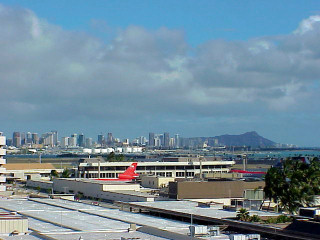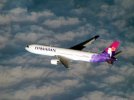HAL Update
 Hawaiian MEC Approves Tentative Agreement
Hawaiian MEC Approves Tentative Agreement



After a year and a half of bargaining, including challenging management lawyers on the courthouse steps, the Hawaiian MEC approved a tentative contract with management on February 22. Informational road shows for pilots are scheduled to begin the week of February 28, and the membership ratification vote will likely take place the week of March 7.
Pilot negotiators bargained an agreement that preserves the pilots' defined benefit plan through 2012 and gives the parties a chance to look at the issue of future retirement security and benefits more carefully. The TA also allows Hawaiian pilots who are 50 years old and older to remain in the pension plan beyond the 2012 mark to finish their careers. Modest improvements in hourly pay, and compensation for deadhead, landing credits, deadheading, and training pay along with increased per diem reimbursement, are also in the TA.
Disability benefits will now be paid out of a newly created voluntary employee beneficiary association (VEBA) instead of the retirement plan. At the same time, changes in work rules and operational provisions are a "win-win" for both parties and will allow Hawaiian to emerge from bankruptcy protection. The court hearing to do just that should soon be scheduled.
The agreement was negotiated against the backdrop of the Section 1113 bankruptcy process, which management was trying to use to impose deep cuts in pilot pay and retirement and disability benefits, despite the airline's record profits. The TA was finished on the day after the Court hearing was scheduled to begin, but the litigation was postponed to allow the parties to continue negotiations.
"This contract is one that we can be proud of," says the Negotiating Committee chairman, Capt. Jim Giddings. "It accomplishes our most important priorities, builds in improvements we've tried to achieve for a long time and allows Hawaiian to emerge from bankruptcy. More importantly, Hawaiian pilots will be back at the bargaining table soon looking for additional improvements."
If approved by the members, the new work agreement would have an amendable date of July 2007 with a return to the bargaining table in late 2006.




After a year and a half of bargaining, including challenging management lawyers on the courthouse steps, the Hawaiian MEC approved a tentative contract with management on February 22. Informational road shows for pilots are scheduled to begin the week of February 28, and the membership ratification vote will likely take place the week of March 7.
Pilot negotiators bargained an agreement that preserves the pilots' defined benefit plan through 2012 and gives the parties a chance to look at the issue of future retirement security and benefits more carefully. The TA also allows Hawaiian pilots who are 50 years old and older to remain in the pension plan beyond the 2012 mark to finish their careers. Modest improvements in hourly pay, and compensation for deadhead, landing credits, deadheading, and training pay along with increased per diem reimbursement, are also in the TA.
Disability benefits will now be paid out of a newly created voluntary employee beneficiary association (VEBA) instead of the retirement plan. At the same time, changes in work rules and operational provisions are a "win-win" for both parties and will allow Hawaiian to emerge from bankruptcy protection. The court hearing to do just that should soon be scheduled.
The agreement was negotiated against the backdrop of the Section 1113 bankruptcy process, which management was trying to use to impose deep cuts in pilot pay and retirement and disability benefits, despite the airline's record profits. The TA was finished on the day after the Court hearing was scheduled to begin, but the litigation was postponed to allow the parties to continue negotiations.
"This contract is one that we can be proud of," says the Negotiating Committee chairman, Capt. Jim Giddings. "It accomplishes our most important priorities, builds in improvements we've tried to achieve for a long time and allows Hawaiian to emerge from bankruptcy. More importantly, Hawaiian pilots will be back at the bargaining table soon looking for additional improvements."
If approved by the members, the new work agreement would have an amendable date of July 2007 with a return to the bargaining table in late 2006.




